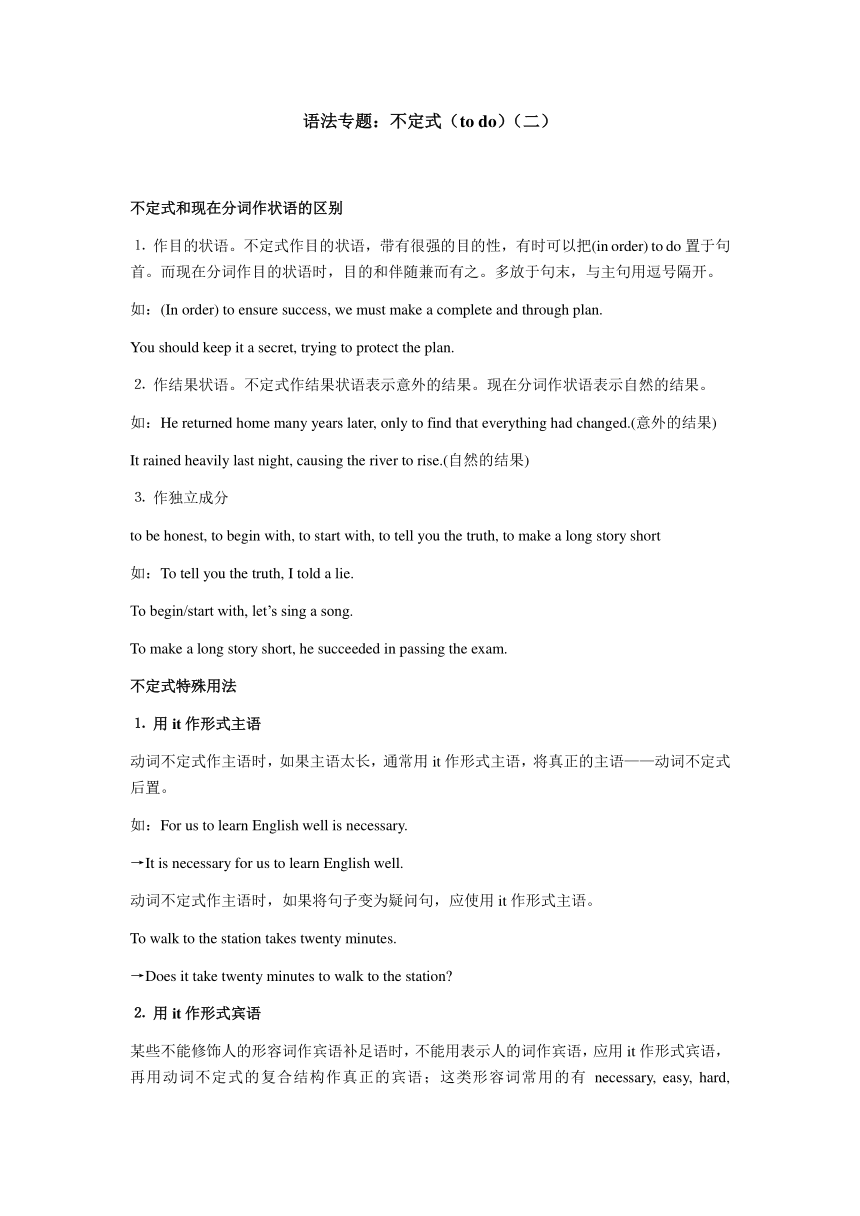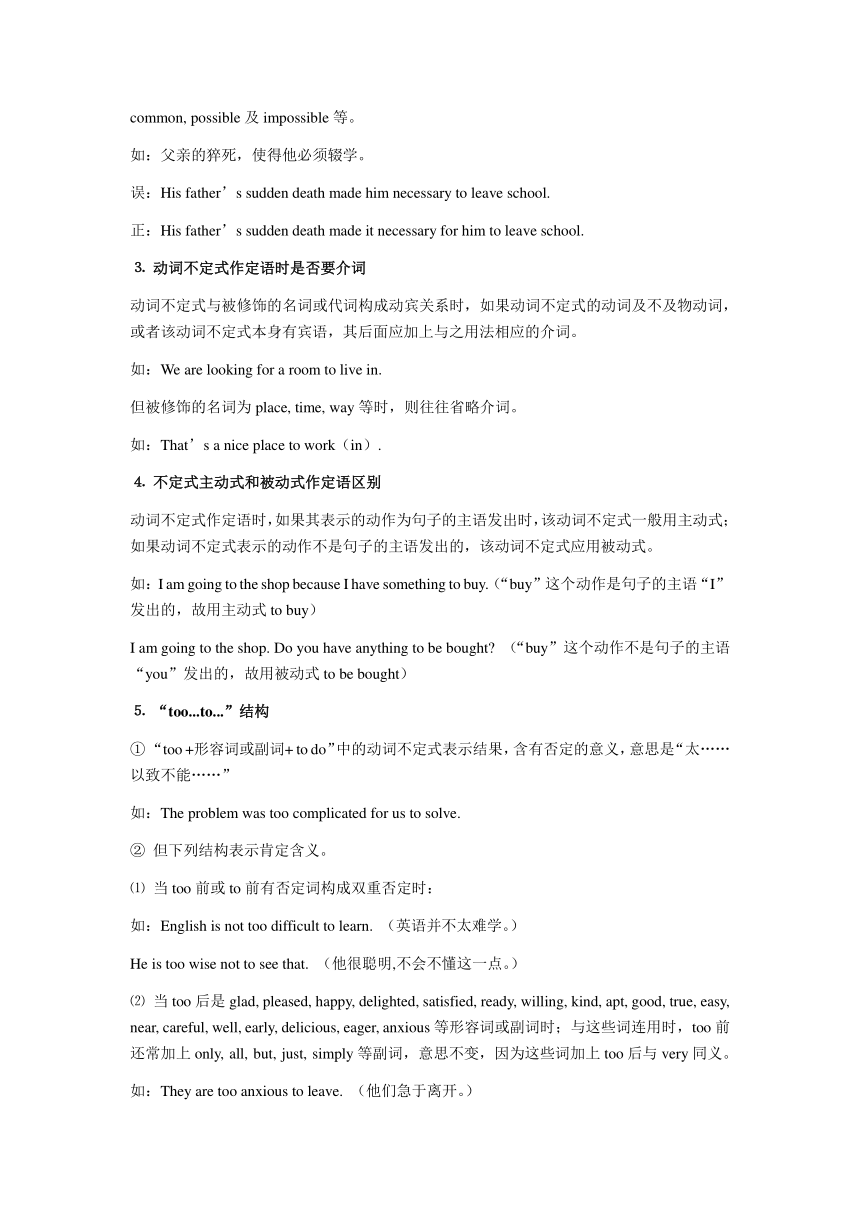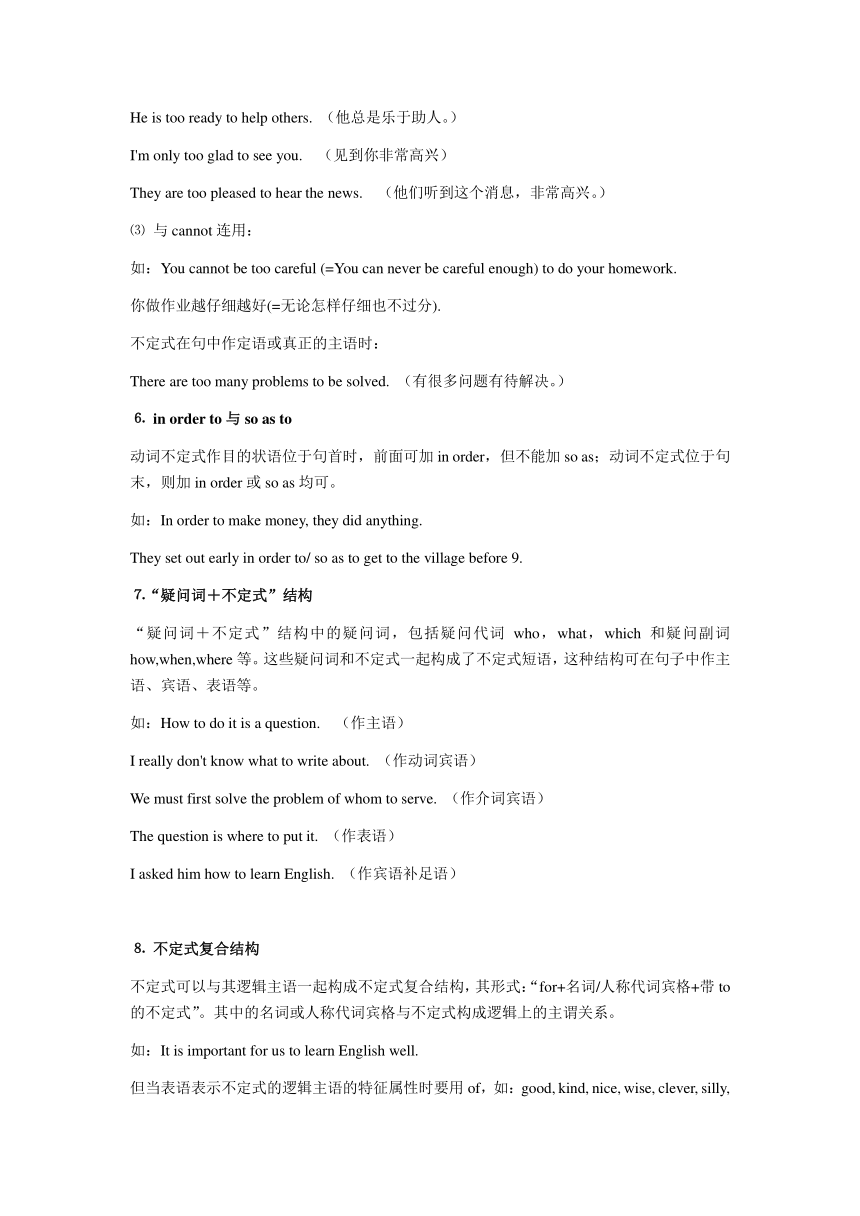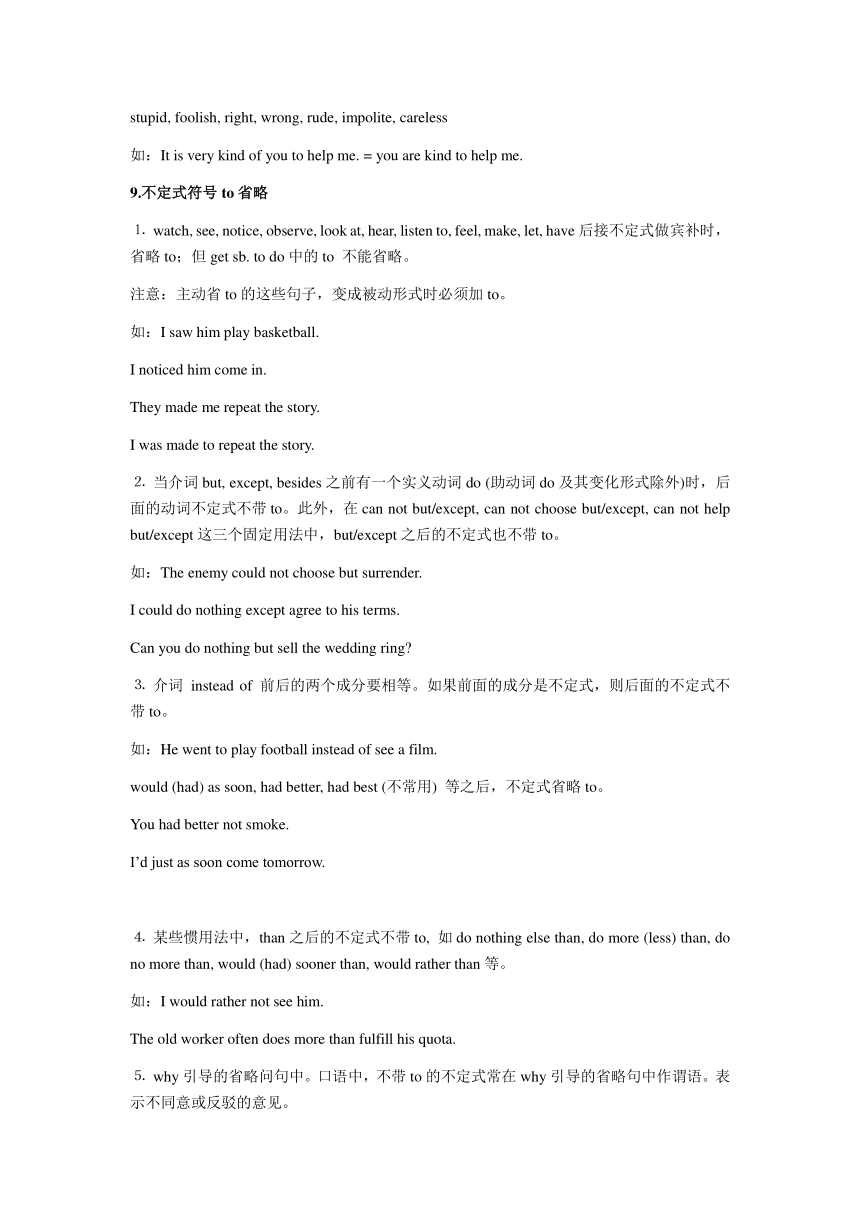2024年人教版中考英语语法专题不定式 (2)的讲解+课后练习(含答案)
文档属性
| 名称 | 2024年人教版中考英语语法专题不定式 (2)的讲解+课后练习(含答案) |  | |
| 格式 | docx | ||
| 文件大小 | 29.8KB | ||
| 资源类型 | 教案 | ||
| 版本资源 | 人教新目标(Go for it)版 | ||
| 科目 | 英语 | ||
| 更新时间 | 2024-03-02 16:13:46 | ||
图片预览




文档简介
语法专题:不定式(to do)(二)
不定式和现在分词作状语的区别
⒈ 作目的状语。不定式作目的状语,带有很强的目的性,有时可以把(in order) to do置于句首。而现在分词作目的状语时,目的和伴随兼而有之。多放于句末,与主句用逗号隔开。
如:(In order) to ensure success, we must make a complete and through plan.
You should keep it a secret, trying to protect the plan.
⒉ 作结果状语。不定式作结果状语表示意外的结果。现在分词作状语表示自然的结果。
如:He returned home many years later, only to find that everything had changed.(意外的结果)
It rained heavily last night, causing the river to rise.(自然的结果)
⒊ 作独立成分
to be honest, to begin with, to start with, to tell you the truth, to make a long story short
如:To tell you the truth, I told a lie.
To begin/start with, let’s sing a song.
To make a long story short, he succeeded in passing the exam.
不定式特殊用法
⒈ 用it作形式主语
动词不定式作主语时,如果主语太长,通常用it作形式主语,将真正的主语——动词不定式后置。
如:For us to learn English well is necessary.
→It is necessary for us to learn English well.
动词不定式作主语时,如果将句子变为疑问句,应使用it作形式主语。
To walk to the station takes twenty minutes.
→Does it take twenty minutes to walk to the station
⒉ 用it作形式宾语
某些不能修饰人的形容词作宾语补足语时,不能用表示人的词作宾语,应用it作形式宾语,再用动词不定式的复合结构作真正的宾语;这类形容词常用的有necessary, easy, hard, common, possible及impossible等。
如:父亲的猝死,使得他必须辍学。
误:His father’s sudden death made him necessary to leave school.
正:His father’s sudden death made it necessary for him to leave school.
⒊ 动词不定式作定语时是否要介词
动词不定式与被修饰的名词或代词构成动宾关系时,如果动词不定式的动词及不及物动词,或者该动词不定式本身有宾语,其后面应加上与之用法相应的介词。
如:We are looking for a room to live in.
但被修饰的名词为place, time, way等时,则往往省略介词。
如:That’s a nice place to work(in).
⒋ 不定式主动式和被动式作定语区别
动词不定式作定语时,如果其表示的动作为句子的主语发出时,该动词不定式一般用主动式;如果动词不定式表示的动作不是句子的主语发出的,该动词不定式应用被动式。
如:I am going to the shop because I have something to buy.(“buy”这个动作是句子的主语“I”发出的,故用主动式to buy)
I am going to the shop. Do you have anything to be bought (“buy”这个动作不是句子的主语“you”发出的,故用被动式to be bought)
⒌ “too...to...”结构
① “too +形容词或副词+ to do”中的动词不定式表示结果,含有否定的意义,意思是“太……以致不能……”
如:The problem was too complicated for us to solve.
② 但下列结构表示肯定含义。
⑴ 当too前或to前有否定词构成双重否定时:
如:English is not too difficult to learn. (英语并不太难学。)
He is too wise not to see that. (他很聪明,不会不懂这一点。)
⑵ 当too后是glad, pleased, happy, delighted, satisfied, ready, willing, kind, apt, good, true, easy, near, careful, well, early, delicious, eager, anxious等形容词或副词时;与这些词连用时,too前还常加上only, all, but, just, simply等副词,意思不变,因为这些词加上too后与very同义。
如:They are too anxious to leave. (他们急于离开。)
He is too ready to help others. (他总是乐于助人。)
I'm only too glad to see you. (见到你非常高兴)
They are too pleased to hear the news. (他们听到这个消息,非常高兴。)
⑶ 与cannot连用:
如:You cannot be too careful (=You can never be careful enough) to do your homework.
你做作业越仔细越好(=无论怎样仔细也不过分).
不定式在句中作定语或真正的主语时:
There are too many problems to be solved. (有很多问题有待解决。)
⒍ in order to与so as to
动词不定式作目的状语位于句首时,前面可加in order,但不能加so as;动词不定式位于句末,则加in order或so as均可。
如:In order to make money, they did anything.
They set out early in order to/ so as to get to the village before 9.
⒎“疑问词+不定式”结构
“疑问词+不定式”结构中的疑问词,包括疑问代词who,what,which和疑问副词how,when,where等。这些疑问词和不定式一起构成了不定式短语,这种结构可在句子中作主语、宾语、表语等。
如:How to do it is a question. (作主语)
I really don't know what to write about. (作动词宾语)
We must first solve the problem of whom to serve. (作介词宾语)
The question is where to put it. (作表语)
I asked him how to learn English. (作宾语补足语)
⒏ 不定式复合结构
不定式可以与其逻辑主语一起构成不定式复合结构,其形式:“for+名词/人称代词宾格+带to的不定式”。其中的名词或人称代词宾格与不定式构成逻辑上的主谓关系。
如:It is important for us to learn English well.
但当表语表示不定式的逻辑主语的特征属性时要用of,如:good, kind, nice, wise, clever, silly, stupid, foolish, right, wrong, rude, impolite, careless
如:It is very kind of you to help me. = you are kind to help me.
9.不定式符号to省略
⒈ watch, see, notice, observe, look at, hear, listen to, feel, make, let, have后接不定式做宾补时,省略to;但get sb. to do中的to 不能省略。
注意:主动省to的这些句子,变成被动形式时必须加to。
如:I saw him play basketball.
I noticed him come in.
They made me repeat the story.
I was made to repeat the story.
⒉ 当介词but, except, besides之前有一个实义动词do (助动词do及其变化形式除外)时,后面的动词不定式不带to。此外,在can not but/except, can not choose but/except, can not help but/except这三个固定用法中,but/except之后的不定式也不带to。
如:The enemy could not choose but surrender.
I could do nothing except agree to his terms.
Can you do nothing but sell the wedding ring
⒊ 介词instead of 前后的两个成分要相等。如果前面的成分是不定式,则后面的不定式不带to。
如:He went to play football instead of see a film.
would (had) as soon, had better, had best (不常用) 等之后,不定式省略to。
You had better not smoke.
I’d just as soon come tomorrow.
⒋ 某些惯用法中,than之后的不定式不带to, 如do nothing else than, do more (less) than, do no more than, would (had) sooner than, would rather than等。
如:I would rather not see him.
The old worker often does more than fulfill his quota.
⒌ why引导的省略问句中。口语中,不带to的不定式常在why引导的省略句中作谓语。表示不同意或反驳的意见。
如:Why not give her another chance?
Why bother
Why not do it yourself?
⒍ make, hear, let, go构成惯用语时,常用省略to不定式。
如:Can't you make do with 10 pounds?10英磅不可以凑合着用吗?
They let ship the good chance. 他们错过了那次好机会。
The children made believe that they were generals.孩子们假扮成将军。
⒎ 动词go和come之后作状语时省略to:
不定式在动词 go 和 come之后作状语时,在某些情况下总是不带 to。这种用法在祈使句的go 和come之后最常见。在陈述句中也会出现这种用法,但一般在go 和come不发生形态变化的情况下才出现。
如:Go chase yourself!!(走开,别来捣乱!)
Come sit beside me.
You should go thank him.
⒏ 两个或两个以上的不定式并列在一起时,第一个不定式带to,后面的不定式往往把to省去;但表对照时不能省to:
如:I wish to finish my task and (to) get away.
It is better to laugh than to cry.
10.省略动词部分
⒈ 为避免重复,口语中常可省去与前边动词重复的动词原形而留下to。
如:—Would you like to go to the films with me
—I’d like to.
⒉ 如果不定式to后的结构中含有be, have或have been,通常要保留be, have或have been,但随后的成分仍可省略。
如:—Is your mother a teacher
—No, but she used to be.
—He hasn’t finished yet.
—Well, he ought to have.
题型1: 单项选择题
1. We should allow students _____ their own school uniform.
A. choose B. to choose C. choosing D. chose
2.I have a lot of homework ______.
A.do B. doing C .did D.to do
3.He is not an easy man ______.
A. get on B.to get on C .get on with D.to get on with
4.We saw him ______ the building and go upstairs.
A.to enter B. enter C. entering D. entered
5.So much work usually makes them ______ very tired.
A.to feel B. feels C. feeling D. feel
6.Your father is sleeping. You d better ______.
A. not wake up him B. not to wake up him
C. not wake him up D. not to wake him up
7.I was made ______ my homework in the afternoon.
A.do B. doing C.to do D. did
8.Mr Black asked the man ________ the queue.
A. not to jump B.to not jump C. didn’ t jump D. not jump
9.The old man told the child ______ noisy.
A. not be B. not to be C.to not be D.be not
10.There is going to ______ an important meeting tomorrow. Please try ______ late.
A. have, not to be B. have, not be
C. be, not to be D. be, not be
11.Please stop ______ a rest if you feel tired.
A.to have B. having C. have D. has
12.——Why didn’ t you buy some bread on your way home
——Sorry, I forgot ______ some money with me.
A. take B. taking C.to take D. took
13.——Let s have a rest, shall we
——Not now, I can’ t stop ______ the letters.
A. write B.to write C. writing D. and write
14.When I was walking in the street I saw a plane ______ over my head.
A. flies B. flying C. flew D.to fly
15.A woman saw it ______ when she was walking past.
A. happen B. happens C. happening D.to happen
16.Would you like to go to the cinema with us
Yes, ______.What time are we going to meet
A.I would B.I would like C.I like to D.I’ d like to
17.Would you like to go for a picnic with us
______.What time are we going to meet
A. No, I can’ t B. Yes, I’ m glad C. Yes, I’ d love to D. I’ d like
18.The new hospital ______ is near the factory.
A. build B. builds C.to build D.to be built
Keys:1-5: BDDBD 6-10: CCABC
11-15: ACCBA 16-18:DCD
题型2: 用所给词适当形式填空
1. She said she offered ____ (take) me to the shopping center.
2. They decided ____ (play) tennis against Guangming Middle School.
3. He wanted _____ (watch) the football match at the stadium.
4. My parents plan _____ (visit) my grandparents next weekend.
5. David promised ____ (not be)late for school next time.
6. Their parents don't allow them ____(swim) in the river. It's really dangerous.
7. Please tell the boys _____ (not make) any noise. My baby is sleeping.
8. They try to find some more ways to make some animals ____ (work) for people.
9. My friend invited me ____ (watch) Beijing Opera last weekend.
10. I often hear a girl _____ (practise) playing the piano in the classroom.
Keys:
1. to take 依据:offer to do 主动提出做某事2. to play 依据:decide to do 决定做某事3. to watch 依据:want to do 想要做某事
4. to visit 依据:plan to do 计划做某事
5. not to be 依据:promise to do 答应做某事,保证做某事
6. to swim依据:allow sb. to do 允许某人做某事。
7. not to make 依据:tell sb. not to do 告诉某人不要做某事。
8. work 依据:make sb. do 使某人做某事
9. to watch 依据:invite sb. to do 邀请某人做某事
10. practice 依据:hear sb. do 听见某人做某事,指听到的是动作的全过程。
不定式和现在分词作状语的区别
⒈ 作目的状语。不定式作目的状语,带有很强的目的性,有时可以把(in order) to do置于句首。而现在分词作目的状语时,目的和伴随兼而有之。多放于句末,与主句用逗号隔开。
如:(In order) to ensure success, we must make a complete and through plan.
You should keep it a secret, trying to protect the plan.
⒉ 作结果状语。不定式作结果状语表示意外的结果。现在分词作状语表示自然的结果。
如:He returned home many years later, only to find that everything had changed.(意外的结果)
It rained heavily last night, causing the river to rise.(自然的结果)
⒊ 作独立成分
to be honest, to begin with, to start with, to tell you the truth, to make a long story short
如:To tell you the truth, I told a lie.
To begin/start with, let’s sing a song.
To make a long story short, he succeeded in passing the exam.
不定式特殊用法
⒈ 用it作形式主语
动词不定式作主语时,如果主语太长,通常用it作形式主语,将真正的主语——动词不定式后置。
如:For us to learn English well is necessary.
→It is necessary for us to learn English well.
动词不定式作主语时,如果将句子变为疑问句,应使用it作形式主语。
To walk to the station takes twenty minutes.
→Does it take twenty minutes to walk to the station
⒉ 用it作形式宾语
某些不能修饰人的形容词作宾语补足语时,不能用表示人的词作宾语,应用it作形式宾语,再用动词不定式的复合结构作真正的宾语;这类形容词常用的有necessary, easy, hard, common, possible及impossible等。
如:父亲的猝死,使得他必须辍学。
误:His father’s sudden death made him necessary to leave school.
正:His father’s sudden death made it necessary for him to leave school.
⒊ 动词不定式作定语时是否要介词
动词不定式与被修饰的名词或代词构成动宾关系时,如果动词不定式的动词及不及物动词,或者该动词不定式本身有宾语,其后面应加上与之用法相应的介词。
如:We are looking for a room to live in.
但被修饰的名词为place, time, way等时,则往往省略介词。
如:That’s a nice place to work(in).
⒋ 不定式主动式和被动式作定语区别
动词不定式作定语时,如果其表示的动作为句子的主语发出时,该动词不定式一般用主动式;如果动词不定式表示的动作不是句子的主语发出的,该动词不定式应用被动式。
如:I am going to the shop because I have something to buy.(“buy”这个动作是句子的主语“I”发出的,故用主动式to buy)
I am going to the shop. Do you have anything to be bought (“buy”这个动作不是句子的主语“you”发出的,故用被动式to be bought)
⒌ “too...to...”结构
① “too +形容词或副词+ to do”中的动词不定式表示结果,含有否定的意义,意思是“太……以致不能……”
如:The problem was too complicated for us to solve.
② 但下列结构表示肯定含义。
⑴ 当too前或to前有否定词构成双重否定时:
如:English is not too difficult to learn. (英语并不太难学。)
He is too wise not to see that. (他很聪明,不会不懂这一点。)
⑵ 当too后是glad, pleased, happy, delighted, satisfied, ready, willing, kind, apt, good, true, easy, near, careful, well, early, delicious, eager, anxious等形容词或副词时;与这些词连用时,too前还常加上only, all, but, just, simply等副词,意思不变,因为这些词加上too后与very同义。
如:They are too anxious to leave. (他们急于离开。)
He is too ready to help others. (他总是乐于助人。)
I'm only too glad to see you. (见到你非常高兴)
They are too pleased to hear the news. (他们听到这个消息,非常高兴。)
⑶ 与cannot连用:
如:You cannot be too careful (=You can never be careful enough) to do your homework.
你做作业越仔细越好(=无论怎样仔细也不过分).
不定式在句中作定语或真正的主语时:
There are too many problems to be solved. (有很多问题有待解决。)
⒍ in order to与so as to
动词不定式作目的状语位于句首时,前面可加in order,但不能加so as;动词不定式位于句末,则加in order或so as均可。
如:In order to make money, they did anything.
They set out early in order to/ so as to get to the village before 9.
⒎“疑问词+不定式”结构
“疑问词+不定式”结构中的疑问词,包括疑问代词who,what,which和疑问副词how,when,where等。这些疑问词和不定式一起构成了不定式短语,这种结构可在句子中作主语、宾语、表语等。
如:How to do it is a question. (作主语)
I really don't know what to write about. (作动词宾语)
We must first solve the problem of whom to serve. (作介词宾语)
The question is where to put it. (作表语)
I asked him how to learn English. (作宾语补足语)
⒏ 不定式复合结构
不定式可以与其逻辑主语一起构成不定式复合结构,其形式:“for+名词/人称代词宾格+带to的不定式”。其中的名词或人称代词宾格与不定式构成逻辑上的主谓关系。
如:It is important for us to learn English well.
但当表语表示不定式的逻辑主语的特征属性时要用of,如:good, kind, nice, wise, clever, silly, stupid, foolish, right, wrong, rude, impolite, careless
如:It is very kind of you to help me. = you are kind to help me.
9.不定式符号to省略
⒈ watch, see, notice, observe, look at, hear, listen to, feel, make, let, have后接不定式做宾补时,省略to;但get sb. to do中的to 不能省略。
注意:主动省to的这些句子,变成被动形式时必须加to。
如:I saw him play basketball.
I noticed him come in.
They made me repeat the story.
I was made to repeat the story.
⒉ 当介词but, except, besides之前有一个实义动词do (助动词do及其变化形式除外)时,后面的动词不定式不带to。此外,在can not but/except, can not choose but/except, can not help but/except这三个固定用法中,but/except之后的不定式也不带to。
如:The enemy could not choose but surrender.
I could do nothing except agree to his terms.
Can you do nothing but sell the wedding ring
⒊ 介词instead of 前后的两个成分要相等。如果前面的成分是不定式,则后面的不定式不带to。
如:He went to play football instead of see a film.
would (had) as soon, had better, had best (不常用) 等之后,不定式省略to。
You had better not smoke.
I’d just as soon come tomorrow.
⒋ 某些惯用法中,than之后的不定式不带to, 如do nothing else than, do more (less) than, do no more than, would (had) sooner than, would rather than等。
如:I would rather not see him.
The old worker often does more than fulfill his quota.
⒌ why引导的省略问句中。口语中,不带to的不定式常在why引导的省略句中作谓语。表示不同意或反驳的意见。
如:Why not give her another chance?
Why bother
Why not do it yourself?
⒍ make, hear, let, go构成惯用语时,常用省略to不定式。
如:Can't you make do with 10 pounds?10英磅不可以凑合着用吗?
They let ship the good chance. 他们错过了那次好机会。
The children made believe that they were generals.孩子们假扮成将军。
⒎ 动词go和come之后作状语时省略to:
不定式在动词 go 和 come之后作状语时,在某些情况下总是不带 to。这种用法在祈使句的go 和come之后最常见。在陈述句中也会出现这种用法,但一般在go 和come不发生形态变化的情况下才出现。
如:Go chase yourself!!(走开,别来捣乱!)
Come sit beside me.
You should go thank him.
⒏ 两个或两个以上的不定式并列在一起时,第一个不定式带to,后面的不定式往往把to省去;但表对照时不能省to:
如:I wish to finish my task and (to) get away.
It is better to laugh than to cry.
10.省略动词部分
⒈ 为避免重复,口语中常可省去与前边动词重复的动词原形而留下to。
如:—Would you like to go to the films with me
—I’d like to.
⒉ 如果不定式to后的结构中含有be, have或have been,通常要保留be, have或have been,但随后的成分仍可省略。
如:—Is your mother a teacher
—No, but she used to be.
—He hasn’t finished yet.
—Well, he ought to have.
题型1: 单项选择题
1. We should allow students _____ their own school uniform.
A. choose B. to choose C. choosing D. chose
2.I have a lot of homework ______.
A.do B. doing C .did D.to do
3.He is not an easy man ______.
A. get on B.to get on C .get on with D.to get on with
4.We saw him ______ the building and go upstairs.
A.to enter B. enter C. entering D. entered
5.So much work usually makes them ______ very tired.
A.to feel B. feels C. feeling D. feel
6.Your father is sleeping. You d better ______.
A. not wake up him B. not to wake up him
C. not wake him up D. not to wake him up
7.I was made ______ my homework in the afternoon.
A.do B. doing C.to do D. did
8.Mr Black asked the man ________ the queue.
A. not to jump B.to not jump C. didn’ t jump D. not jump
9.The old man told the child ______ noisy.
A. not be B. not to be C.to not be D.be not
10.There is going to ______ an important meeting tomorrow. Please try ______ late.
A. have, not to be B. have, not be
C. be, not to be D. be, not be
11.Please stop ______ a rest if you feel tired.
A.to have B. having C. have D. has
12.——Why didn’ t you buy some bread on your way home
——Sorry, I forgot ______ some money with me.
A. take B. taking C.to take D. took
13.——Let s have a rest, shall we
——Not now, I can’ t stop ______ the letters.
A. write B.to write C. writing D. and write
14.When I was walking in the street I saw a plane ______ over my head.
A. flies B. flying C. flew D.to fly
15.A woman saw it ______ when she was walking past.
A. happen B. happens C. happening D.to happen
16.Would you like to go to the cinema with us
Yes, ______.What time are we going to meet
A.I would B.I would like C.I like to D.I’ d like to
17.Would you like to go for a picnic with us
______.What time are we going to meet
A. No, I can’ t B. Yes, I’ m glad C. Yes, I’ d love to D. I’ d like
18.The new hospital ______ is near the factory.
A. build B. builds C.to build D.to be built
Keys:1-5: BDDBD 6-10: CCABC
11-15: ACCBA 16-18:DCD
题型2: 用所给词适当形式填空
1. She said she offered ____ (take) me to the shopping center.
2. They decided ____ (play) tennis against Guangming Middle School.
3. He wanted _____ (watch) the football match at the stadium.
4. My parents plan _____ (visit) my grandparents next weekend.
5. David promised ____ (not be)late for school next time.
6. Their parents don't allow them ____(swim) in the river. It's really dangerous.
7. Please tell the boys _____ (not make) any noise. My baby is sleeping.
8. They try to find some more ways to make some animals ____ (work) for people.
9. My friend invited me ____ (watch) Beijing Opera last weekend.
10. I often hear a girl _____ (practise) playing the piano in the classroom.
Keys:
1. to take 依据:offer to do 主动提出做某事2. to play 依据:decide to do 决定做某事3. to watch 依据:want to do 想要做某事
4. to visit 依据:plan to do 计划做某事
5. not to be 依据:promise to do 答应做某事,保证做某事
6. to swim依据:allow sb. to do 允许某人做某事。
7. not to make 依据:tell sb. not to do 告诉某人不要做某事。
8. work 依据:make sb. do 使某人做某事
9. to watch 依据:invite sb. to do 邀请某人做某事
10. practice 依据:hear sb. do 听见某人做某事,指听到的是动作的全过程。
同课章节目录
- 词法
- 名词
- 动词和动词短语
- 动词语态
- 动词时态
- 助动词和情态动词
- 非谓语动词
- 冠词
- 代词
- 数词和量词
- 形容词副词及其比较等级
- 介词和介词短语
- 连词和感叹词
- 构词法
- 相似、相近词比较
- 句法
- 陈述句
- 一般疑问句和否定疑问句
- 特殊疑问句及选择疑问句
- 反意疑问句
- 存在句(There be句型)
- 宾语从句
- 定语从句
- 状语从句
- 主谓一致问题
- 简单句
- 并列句
- 复合句
- 主谓一致
- 主、表语从句
- 名词性从句
- 直接引语和间接引语
- 虚拟语气
- 感叹句
- 强调句
- 倒装句
- 祈使句
- 句子的成分
- 句子的分类
- 题型专区
- 单项选择部分
- 易错题
- 完形填空
- 阅读理解
- 词汇练习
- 听说训练
- 句型转换
- 补全对话
- 短文改错
- 翻译
- 书面表达
- 任务型阅读
- 语法填空
- 其他资料
